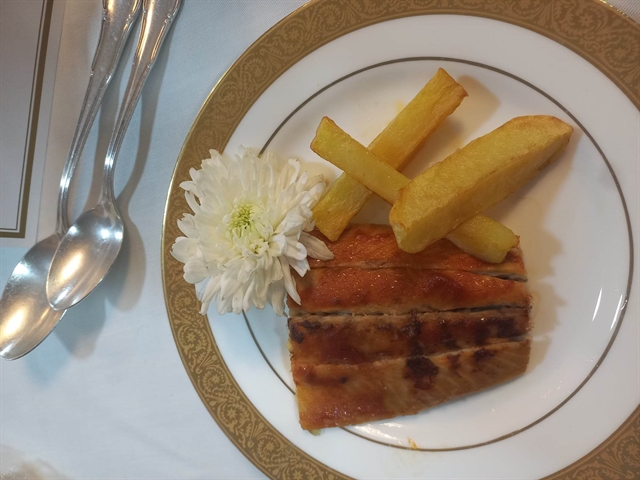After five years of not going across the border, I was excited about a trip to Bangladesh, a country that I had almost no idea about but was eager to discover.

Biryani with chicken is one of the most beloved dishes to not only Bangladeshi people but also visitors. — Photo maggi.in
Thanh Hà
After five years of not going across the border, I was excited about a trip to Bangladesh, a country that I had almost no idea about but was eager to discover.
My friends advised me to keep a small place in the suitcase for instant noodles, a Vietnamese indispensable dish, to ensure that I would not be hungry in this distinctive country.
They said despite an Asian country with rice eating habits, food in Bangladesh is totally different and strange in terms of cooking method, taste and flavour.
They were right, but I had no chance to eat my noodles because the Bangladeshi people offered me such amazing food over seven days.
I asked local people about their best food and what was their suggestion for a tourist. All answers were "biryani".
“Without biryani, no festival can be thought of in Bangladesh; if there is a wedding, a religious festival or a small party there must be biryani,” said Mayeenuddin Numan, a Dhaka resident.
“Having no biryani, meaning you have not been to Bangladesh yet. This popular dish is available at every corner in the country, especially Dhaka, from street vendor shops to high-end restaurants.”
Biryani, is a mixed dish with different layers of marinated meat and long, slender-grained fragrant rice with lots of spices and aromatic ingredients that are steamed together under a very low flame.
The meat can be various, from goat meat, beef and seafood to vegetables to serve all people’s demands. It seemed that biryani with chicken and mutton were the most popular.
The mutton version is for sure a choice of those who love meaty chewy food, while chicken suits diners who prefer something more sublime yet flavourful and juicy.
My first chicken biryani was made by a five-star hotel chefs in Dhaka. Carefully but curiously, I just took a small spoon of the rice for tasting. Wow! It was so delicious that I took a second, third and then a full dish of the specialty, ignoring many other inviting plates.
In one bite, I could enjoy the fragrance of the rice cooked in vegetable oil; the flavour of mustard, ginger, cumin seeds, chilli, garlic and turmeric among many, and the soft and insanely tender chicken. The tenderness comes from the yogurt in the cooking process, which helps soften up the texture of the chicken and makes it melt in your mouth.
The dish was served with a range of sides such as dahi chutney or raita, korma, curry, a sour dish of aubergine, boiled egg, and salad, but I myself took spicy and sour pickles. It was an incomparable taste and for that, I was sure, anyone would eat this dish again and again.
The second food that I wanted to recommend was the hilsa fish that I had during an invitational dinner. Fish is an integral part of the Bangladeshi daily diet. Not only is it the staple diet, but the fish is also of customary significance with ceremonies related to marriage, birth and death.

Smoked hilsa, a must-try delicious dish of Bangladesh. — VNS Photo Thanh Hà
Hilsa is called the ‘King of Fish’ and the national fish of Bangladesh. The abundantly available and inexpensive fish is prepared in multiple ways. It can be fried, steamed, baked, and prepared with curry, mustard and various condiments.
For the dinner my friend suggested I try, the special smoked hilsa, which was differently delicious from most popular types of fish, such as salmon, mackerel, whitefish and trout.
I was served a piece of brown small thin no-bone fillet, which went with some French fries that did not look special at all.
But it really made a bang for me. Different from other dishes that burst with flavour, smoked hilsa was plain, oily, juicy and soft in texture, and the superb mouthfeel that made me enjoy it to it's fullest and understand why it is beloved across the country.
The last dish that impressed me were crispy dosas, thin crepes made from a fermented batter of ground black lentils and rice. The chef spreads the batter as thin as possible on a griddle with drops of oil. He then adds a little more oil and cooks it on a low flame for a longer period until it goes golden brown.

A chef at the Pan Pacific Sonargaon Dhaka Hotel makes dosa. The crispy crepe can be either savoury or sweet dish for diners. — VNS Photo Thanh Hà
The chef then used a flat spatula to remove the dosa from the edges. He either rolls the dosa or folds it at the centre with the spatula. Removed from the pan, it is served immediately. It can be eaten as a plain dosa, or a savoury or sweet dish depending on your choice of filling, which can be a variety of vegetable curries, chutney, ghee or jaggery. Or you can take it with a little butter and jam like me. They are utterly perfect.

Dosa with stir-fried mashed potato and carrot. — VNS Photo Thanh Hà
Bangladesh has a wealth of delightful authentic foods to try. Be like me, test as much as possible and let your stomach have no borders. The noodles can surely wait! VNS